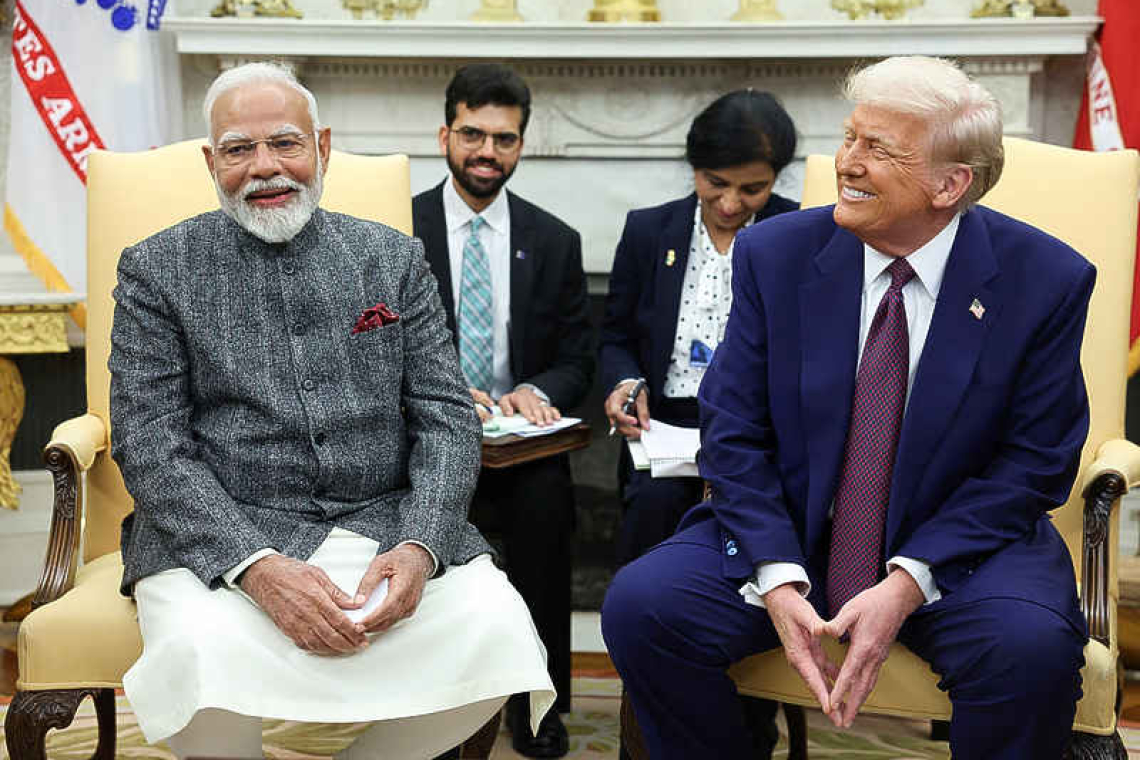WASHINGTON--U.S. President Donald Trump said on Thursday that Indian Prime Minister Narendra Modi had offered to talk about easing tariffs, buying more U.S. oil, gas and combat aircraft, concessions that may deter a trade war.
The agreements came as the two leaders huddled for White House talks hours after Trump unveiled a roadmap for reciprocal tariffs on every country that puts duties on U.S. imports, his latest trade salvo directed at American friends and foes that the White House says will strengthen economic and national security.
Some of the goals were aspirational: India wants to increase by "billions of dollars" its purchases of U.S. defense equipment, including fighter jets, and may make Washington the "number one supplier" of oil and gas, Trump said at a press conference. And Delhi wants to double trade with Washington by 2030, Modi said.
"We're also paving the way to ultimately provide India with the F-35 stealth fighters," said Trump.
The F-35 is the most expensive U.S. defense programme and Lockheed Martin's biggest revenue generator. The F-35 Lightning II was on display at an airshow in India this week.
Whether the deals resolve trade issues between the countries is not yet clear.Although Trump had a warm relationship with Modi in his first term, he again on Thursday said India's tariffs were "very high" and promised to match them, even after his earlier levies on steel and aluminum hit India particularly hard.
"We are being reciprocal with India," Trump said during the press conference. "Whatever India charges, we charge them."
But the two leaders agreed to trade talks to resolve those differences, and expressed optimism they could wrap up those talks soon. A senior Trump administration official said a deal could be reached as soon as this year.
"One thing that I deeply appreciate, and I learn from President Trump, is that he keeps the national interest supreme," Modi said earlier as he sat alongside Trump in the Oval Office. "Like him, I also keep the national interest of India at the top of everything else."
The two leaders also agreed to deepen security cooperation in the Indo Pacific, a thinly veiled reference to competition with China, to joint production on technologies like artificial intelligence and on nuclear energy.
Asked before the meeting about the steps India was taking, one source described it as a "gift" for Trump designed to lower trade tensions. A Trump aide, meanwhile, said that the president sees defense and energy sales to India lowering the U.S. trade deficit.
It's not clear whether the case of billionaire Gautam Adani came up in the talks after his indictment by the U.S. Justice Department in November over an alleged bribery scheme. Adani hails from Modi's western state of Gujarat and his Adani Group runs several key infrastructure projects across the globe. Opponents and critics often allege the meteoric rise of Adani's ports-to-energy empire was partly due to his close relations with, and favorable treatment by, administrations run by Modi's BJP and its allies. The duo have repeatedly denied impropriety.
On Thursday, Modi said countries don't meet to discuss such topics.
Tariffs will continue to dominate the two countries' relationship, said Richard Rossow, head of the India program at the Center for Strategic and International Studies, a Washington think tank."It's going to be a boxing match," he said. "India is willing to take a few hits, but there's a limit."
The U.S. has a $45.6 billion trade deficit with India. Overall, the U.S. trade-weighted average tariff rate has been about 2.2%, according to World Trade Organization data, compared with India's 12%.







